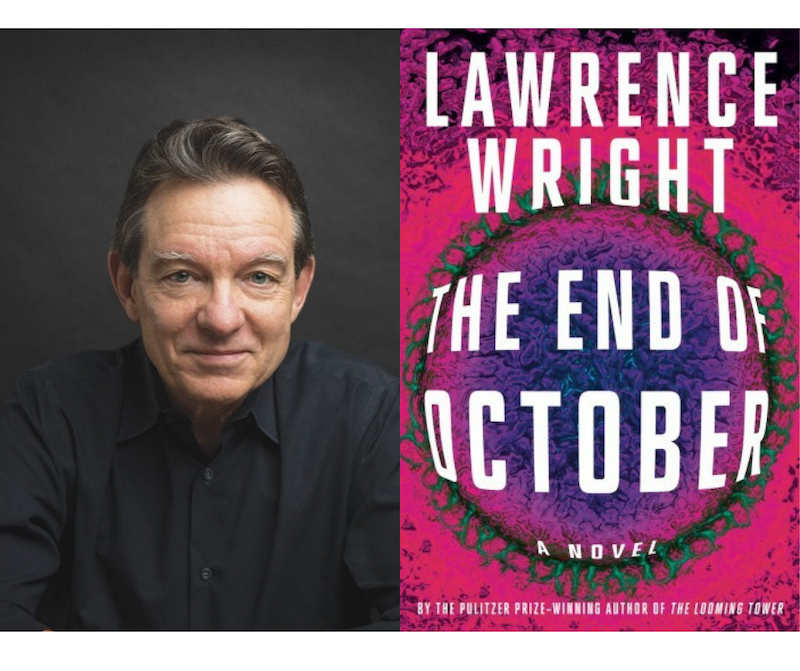The End of October: A Journalist Writes a Pandemic Thriller
Review of Lawrence Wright: Online presented by Seattle Arts and Lectures
Written by Teen Writer Yoon Lee and edited by Teen Editor Anya Shukla

There’s a certain existential dread that comes with reading pandemic stories, but compared to the other major book about massive, species-threatening diseases (World War Z), The End of October has a certain flair of dread: influenza. As I learned during Lawrence Wright: Online, a recent event at Seattle Arts and Lectures (SAL), the author has surprisingly firsthand knowledge of infectious diseases.
The flu is so common that the “usual” variants of the disease are seen as regular occurrences. As such, the impact of influenza is often lost on us. However, Lawrence Wright’s The End of October drives home the now all-too-familiar terror of a hidden killer that is transmitted through the very air we breathe; a danger that we cannot see.
The End of October documents an epidemiologist, Henry Parsons, as he scrambles to contain a newfound disease that has killed dozens in an Indonesian refugee camp. Deemed Kongoli flu, the disease rages through the camp and soon breaks out into Mecca, Saudi Arabia, in the midst of its three-million-strong pilgrimage—a nightmare for an epidemiologist hoping to contain a deadly disease. Now, stuck in Saudi Arabia, Henry has to figure out how to fight this epidemic as countries begin to go to war and the chances of his family’s survival in the US continue to wane.
Wright may seem an unlikely author of The End of October, as he has written extensively about politics and Al-Qaeda, both in books and as a journalist for the New York Times. However, he began his career in journalism by covering diseases.
“I think the hardest part of writing is where the ideas come from. Sometimes they take decades to become realized,” said Wright during the SAL event. “They all stem from being a young reporter in 1976, I was living in Atlanta, and that was where the Center for Disease Control was located. I did several stories out of there.”
One of the stories Wright followed as a reporter was the swine flu epidemic of 1976. At this time, many believed the disease to be a rebirth of the 1918 flu which had killed between 50 and 100 million people. “That experience was very meaningful to me. I would go over the Center for Disease Control, and the people I met there I thought were remarkable. Noble, in a way. They were intelligent, they were humble, they were brave, they would go to these hotspots that I wouldn’t be caught dead in,” Wright said. “It really made an impression.”
His roots in reporting on epidemiology are skillfully woven into The End of October. Almost every health official, epidemiologist, biologist, and researcher is portrayed as brave, intelligent, and humble, all traits that Wright evidently picked up on when reporting at the CDC 45 years ago. His experience as a political reporter is palpable. The fictional Kongoli flu first started in a refugee camp in Indonesia, a refugee camp largely made up of gay Muslims with HIV. In the novel, Henry automatically fears the political and religious outcry as conspiracy theorists begin honing in on these already oft-targeted communities. Additionally, the next major Kongoli outbreak is during a historic migration to Mecca, in Saudi Arabia. Wright here excels through his experience in Middle Eastern politics and religion, navigating the significance of this event, as well as the nebulous workings of the Saudi Arabian government. He seems to make similar political commentary during the later conflict of the story, a fleshed-out portrayal of Russian cyberattacks and eventual worldwide bio-warfare. Wright covers these issues with intelligence and maturity.
I have two major complaints, however. Henry Parsons functions as a protagonist, but he exemplifies the stereotype of a good doctor with a horrible past. Other characters also lack development: almost all are either cartoonishly evil and uncaring or extremely humanist and sympathetic. (This excludes the characters that follow a subplot regarding Russian intervention in US affairs and their attempt to bring it into the public light by publishing it in a newspaper—once again, demonstrating Wright’s expertise in politics and journalism.) There are also a few, painfully-written sexual scenes. They aren’t long, at most a paragraph, but most could have easily been excluded without significant impact to the plot. These scenes often took me out of an otherwise serious and professional atmosphere.
The End of October is a bit lacking in the character department, but as documentation of a civilization-threatening disease, and the political gun-pointing that follows a deadly pandemic, is impeccably written and strikingly relevant to our current times.
Lawrence Wright: Online was presented by Seattle Arts and Lectures on February 9, 2021. To learn more about Lawrence Wright and The End of October click here.
Lead photo credit: Lawrence Wright author photo. Courtesy of Lawrence Wright website.
The TeenTix Newsroom is a group of teen writers led by the Teen Editorial Staff. For each review, Newsroom writers work individually with a teen editor to polish their writing for publication. The Teen Editorial Staff is made up of 6 teens who curate the review portion of the TeenTix blog. More information about the Teen Editorial Staff can be found HERE.
The TeenTix Press Corps promotes critical thinking, communication, and information literacy through criticism and journalism practice for teens. For more information about the Press Corps program see HERE.


